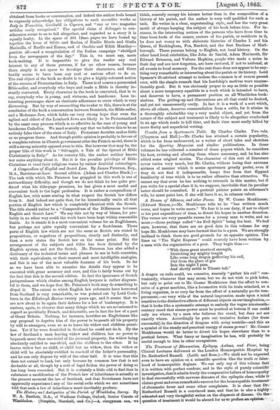A Compendium of English and Scotch Law. By James Paterson,
Esq., M.A., Barrister-at-Law. Second edition. (Adam and Charles Black.)— The task with which Mr. Paterson has grappled in this work is one of extraordinary difficulty, and though we do not think he has quite pro- duced what his title-page promises, he has given a most useful and convenient book to the legal profession. It is rather a compendium of English law, with notes stating in what respect the Scotch law differs from it. And indeed not quite that, for he intentionally omits all that portion of English law which is completely identical with the Scotch. The title should rather be a "Compendium of the Differences between English and Scotch Law." We say this not by way of blame, for pro- bably in no other way could. the work have been kept within reasonable limits. As it stands it is a most convenient volume for an Englishman, but perhaps not quite equally convenient for a Scotchman. Those parts of English law which are not the same as Scotch are stated in propositions, or negatives of propositions, clearly and distinctly, and then a note states the Scotch law on the same point. But the arrangement of the subjects and titles has been dictated by the English system, and not the Scotch. Mr. Paterson has also added a dictionary of the technical terms and phrases in use in both countries, with their equivalents, or their nearest and most intelligible analogies, and this is one of the most valuable features of his book. So far as we have been able to examine the details they appear to be executed with great accuracy and care, and this is fairly borne out by the fact that this is the second edition. In fact the ignorance of Scotch jurisprudence which obtains among English lawyers is rather disgrace- ful to them, and we hope that Mr. Paterson's book may do something to dispel it. The extent to which English law reformers have borrowed from Scotland is very remarkable, as was pointed out by Lord Cock- burn in the Edinburgh Review twenty years ago, and it seems that we are now about to be again their debtors for a law of bankruptcy. It is curious, again, to observe that many things which we are accustomed to regard as peculiarly French, and detestable, are in fact the law of a part of Great Britain. Nothing, for instance, horrifies an Englishman like any proposal to deprive him of the power to bequeath all his property by will to strangers, even so as to leave his widow and children penni- less. Yet if he were domiciled in Scotland he could not do it. By the law of Scotland a man leaving widow and children has no power to bequeath more than one-third of his personal property, the widow being absolutely entitled to one-third, and the children to the other. If he leaves widow but no child, or child but no widow, then the widow or child will be absolutely entitled to one-half of the father's personality, and he can only dispose by will of the other half. It is truer that this does not extend to land, but only because by common law that is not devisable at all, though by a sort of legal fiction the power of doing so has long been conceded. But it is certainly a little odd to find that in substance a modification of the French law of inheritance is actually at the present moment the law of Scotland, and that Scotchmen have not apparently experience) any of the social evils which we are sometimes told that such a law of inheritance must inevitably produce.






























 Previous page
Previous page